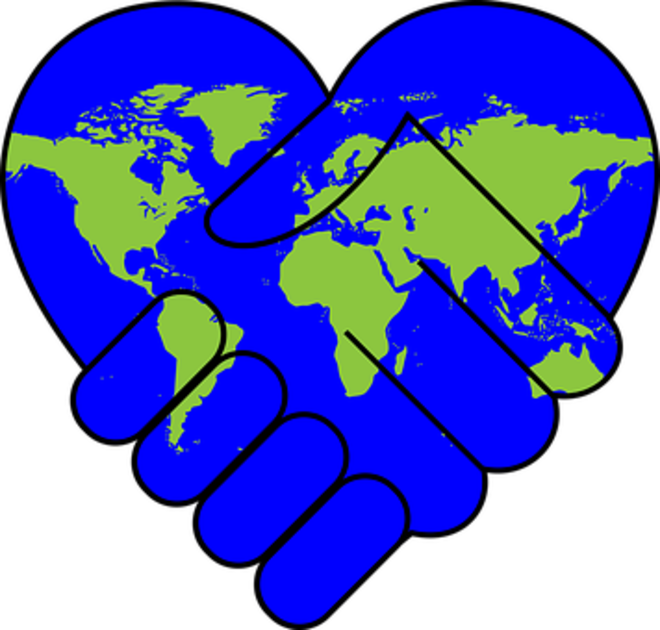
One Nation, Indivisible - Parshat Yitro
Each week I look for something meaningful in the parsha and then see if it helps us in our search for meaning. If yes, then "voila!" The blog is born. If not, I continue my search. If I'm not sure, then I soul search. Is it really meaningful or am I forcing it? Is it meaningful only to me or can it be meaningful to others?
And so, I found myself wondering if unity has value in its own right or is it just a prerequisite for other things. The Torah tells us in Parshat Yitro that Bnei Yisrael camped in the desert and, immediately following that, camped at Mount Sinai.1 In the Hebrew text, the first time the word 'camping' is written, it is in the plural form, 'vayachanu', while the second time it is written we find it in the singular form, 'vayichan'. Rashi explains that the change is to show us the uniqueness of that camping. It was the only time in the desert that they camped in harmony. Interestingly, after this display of unity they were deemed worthy enough to receive the Torah.2 So, is unity important in and of itself or only for what it will lead to, in this case – God's revelation?
This question is appropriate in many situations. Is a family a group of biologically connected individuals or a unit? In a marriage, are there two individuals sharing common goals or a couple? How about at work? Or on a team? Is unity a non-negotiable value? Who really cares?
The answer, I believe, is either both or it depends. Unity is the way we view the group – as a unit. It describes a sense of togetherness that helps bind a group – whether commuters waiting together at a bus stop or fans of a sports team. Certain behaviors and decisions will then be based on this attitude.
Evolutionarily, belonging to a group helps protect us. But beyond that it provides a place for us to be connected and to fill certain emotional, developmental, religious and psychological needs. We were created as social beings - as a pair - as God "saw that it was not good for Adam to be alone."3 Social needs, after all, are to be fulfilled to reach self-actualization, says psychologist Abraham Maslow.4 Being alone as a human just doesn’t work.
There are obviously times where the group's needs are the determining factor and times where the individual's needs are. And there can even be sometimes where the 'individual as a member of the group' is the determining factor. "The needs of the many," says Mr. Spock of Star Trek, "outweigh the needs of the few…or the one."5 But is that always true? In the very next film, Captain Kirk says, “the needs of the one outweigh the needs of the many.”6 Sometimes it may be in the best interest of the many to safeguard the needs of the few …or the one. So which is it?
How we make that decision is based on how we value that unity, what the needs are, what price is required, what we are being called on to do and more. In an editorial on the Biz Enhancer website, the site's staff writes, "Following the principal of unity in diversity we can inculcate the tolerance, love and respect for the people coming from varied backgrounds, within our kids. This way we can create an enriched society and an entire nation."7 Unity in diversity – intriguing. So, again we are talking about balance - balance between the individual and the group.
As humans, we are called upon to be responsible towards ourselves and our communities.8 We are called upon to answer global concerns as well. Worldwide environmental concerns, cross-border health issues and global economics are just some of the questions influencing us and calling us to action almost daily. How will we answer? How united do we feel to address these concerns?
I don’t know the best answer to this question. I do know that how we answer that question will impact us all as individuals hopefully united. Unity in diversity…hmmm…sounds nice.
Click here for another logoParsha on Yitro (Let it Be)
Notes
- Shemot 19:2
- Devarim 33:5 displays a similar concept that God was in Yeshurun (Israel) when there was harmony as the leaders gathered and amongst the tribes.
- Bereishit 2:18
- A. Maslow (1943), Psychological Review, 50, 370-396.
- Spock, Mr., in Star Trek II: The Wrath of Khan
- Kirk, Admiral James T., Star Trek III: The Search for Spock
- http://www.bizhancer.com/article/culture-importance-of-unity-in-diversity
- This is a universal value according to Dr. Viktor Frankl in his book Doctor and the Soul. We are all called upon to live a life of meaning where I am responsible for the welfare of the other as well.
Have A Great Shabbat!![]()
For More Information On Logotherapy And How You Can Create A Fuller, More Meaningful Life, Or To Book An Online Session,
- Call Me At +972-54-589-3399, or in Israel 054-5893399
- Contact Me Thru my email at [email protected]

 Previous
Previous

